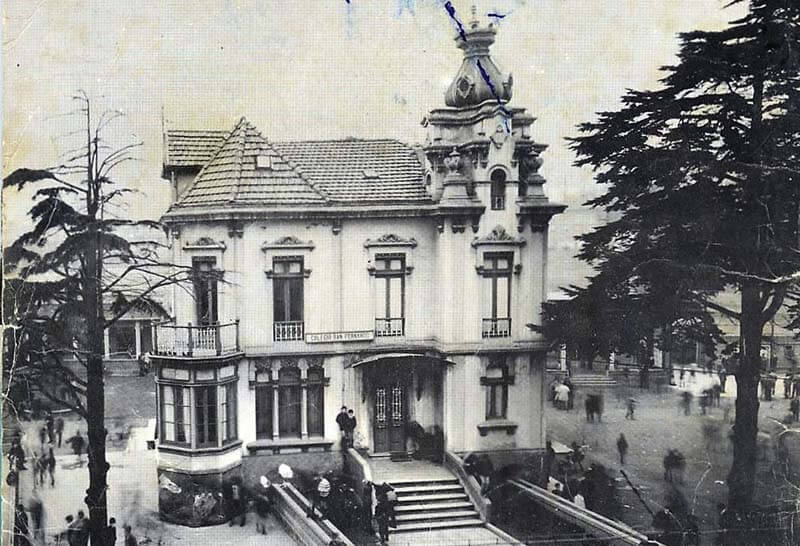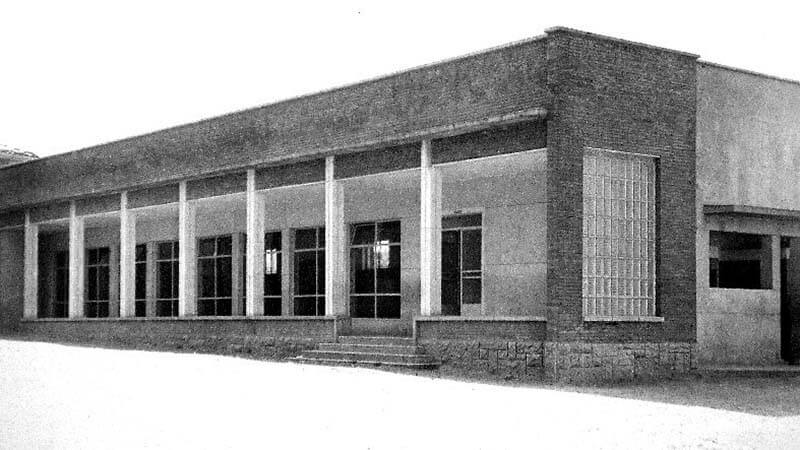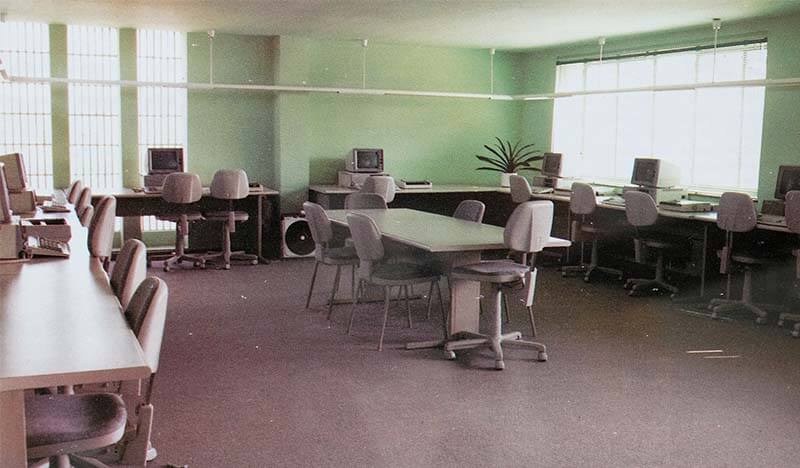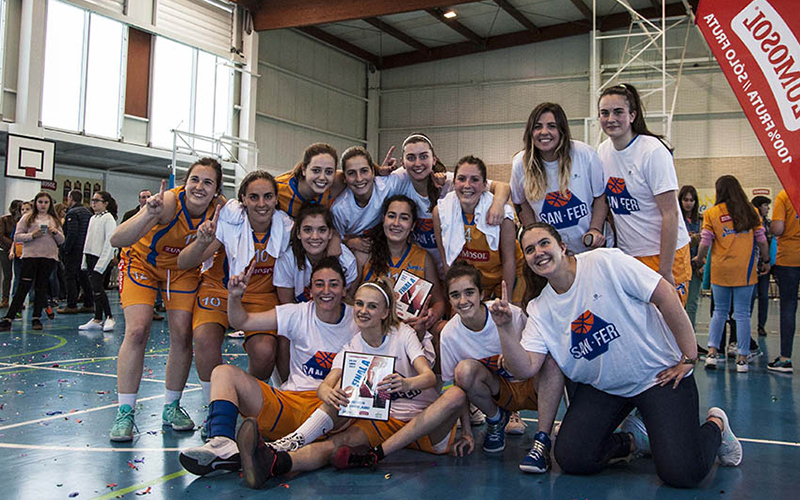
History
A commitment to education from 1941
That's how it all started
In the 1941 year, Avilés was a small village very different from what it is today, with a population that was around the 18.000 inhabitants and overcoming the serious damages caused by the civil war that had ended only two years before, with buildings in ruins, families destroyed for the lack of loved ones, ration cards and queues to buy bread, milk or coal.
Roads and roads in very poor condition made it even more difficult communication between the city and nearby towns. In those years, life was difficult in all aspects.
In these adverse social circumstances, a man emerged, a religious who saw in education a way of changing the world, recognizing its value as the engine of personal and social development.
Mr. Víctor Pérez García-Alvera was born in Juncedo (Molleda), Corvera de Asturias, the 8 of September of 1900 in the bosom of a family formed by his parents and six brothers. He began his studies at the Liceo Avilesino, continued Humanities at the Seminary of Valdediós, and finished his Ecclesiastical Studies at the Seminary of Oviedo, becoming ordained a priest. He obtained a degree in Philosophy and Letters from the University of Santiago de Compostela and a doctorate in Theology.
D. Victor was a kind man, affable, cordial, quite tolerant but firm in his decisions, with very clear ideas of what he wanted. He directed the Colegio San Luis de Pravia for 15 years. He had therefore a great experience in teaching and an undoubted teaching vocation, and with this background he started the School San Fernando.
 D. Víctor Pérez, Founder of the School San Fernando in 1941.
D. Víctor Pérez, Founder of the School San Fernando in 1941.
College Foundation
The center began its classes the 13 of October of 1941 with 50 students of entrance, 34 of Baccalaureate and 17 of Commerce, in a villa of colonial style located in the number two of the street of the Magdalena de Avilés and property of D. Cayetano Prada.
At that time, and according to former founding students, the constructions that were there were the chalet and some tendejones attached to the perimeter walls. The rest of the land was to some extent invaded by the undergrowth, to whose elimination the own students contributed.
From the beginning and for almost two decades, the College offered boarding service, which was located on the third floor below deck. During the following years, the demand for school positions was increasing, and the School was expanding its facilities by building classrooms and laboratories attached to the chalet.
 The College at its first headquarters on Calle La Magdalena de Avilés
The College at its first headquarters on Calle La Magdalena de Avilés
Extension of the School
In the 1950 year, the National Steel Company (ENSIDESA), a public company dedicated to the manufacture of steel, was set up in Avilés. The arrival of ENSIDESA changed the physiognomy of the region of Avilés, which went from being an eminently rural environment to an area with a large industrial presence.
It provoked a spectacular growth of the town of Avilés and other nearby towns, assuming also a great cultural and demographic impact with the arrival of thousands of working families from all over Spain.
The huge increase in population during the 50 years of the last century brought with it a great demand for school posts. The school expanded the number of classrooms with the construction of a building in the form of "L" attached to the outer walls of the plot. In this building, in addition to 10 classrooms, there was a study room that joined a chapel with sliding doors.
The remembered outdoor basketball court was also built, as well as the indoor sports area located next to the study hall.
 Classrooms and study room
Classrooms and study room
Mr. José Martínez, new Director of the School
D. Víctor Pérez 13 died in January of 1970 and was replaced in the direction of the College by his nephew, Mr. José Martínez Pérez. D. José was born in Tabaza (Carreño) in the 1926 year. From the 8 years he was an intern at San Luis de Pravia School, where he was director D. Víctor.
In the year 1941 moved with his uncle to the newly founded College San Fernando, until finishing the Bachillerato. In Gijón he finished his degree as Commercial Professor, and later moved to London, where he perfected his knowledge of English. Upon his return, he began to teach English classes in schools San Fernando and Holy Angel.
D. José was a kind, enthusiastic, persuasive and open-minded person, which allowed him to cultivate the friendship of many people. Over the years, he was assuming greater responsibilities in the management and administration of the school until assuming the direction of the same.
Mr. José Martínez continued to carry out the work of the Director of the center until his death in the 1994 year, at which time his son, Mr. Javier Martínez, took over.
 Mr. José Martínez Pérez, Director of the 1970-1992 School
Mr. José Martínez Pérez, Director of the 1970-1992 School
Transfer to the current school
At the end of the 60 years of the last century the center had a high number of students and in this situation, in 1972 D. José rented a house in Calvo Sotelo street, where 4 moved first courses of EGB while the construction was carried out of a new school in the same location with the purchase of an adjoining plot. At that time they studied in the San Fernando Near 1.000 students distributed between the two sites.
Urban changes stopped this initiative, and by the same dates, rumors began to emerge about the sale of Colegio San Agustín. D. Jose soon contacted his owners, and after hard negotiations, in the summer of 1976 the College San Fernando He moved to his current location, merging the teachers' cloisters and the students of both centers. The San Agustín School had been built in 1965.
The new school has enormous proportions compared to the previous one, with a plot and buildings twelve times larger. This school was far from being finished, with playgrounds without asphalting, entire pavilions closed and unused, and even the gap of a pool that was not made and it was necessary to close for safety. The first efforts were devoted to making the school fully operational, which reached the 2.842 students in the 1982-83 course.
A new stage In the month of September of 1976 2.148 students began their studies, of which approximately 1.000 came from the two buildings of the San Fernando, approximately 500 students of the San Agustín School continued their studies in the San Fernando, and the rest of new incorporation. There were at that time 70 teachers in the College.
 Colegio San Agustín, 70 years
Colegio San Agustín, 70 years
History of the School
-

Mr. Víctor Pérez García-Alvera founded the College San Fernando of Avilés the 13 of October of 1.941.
Mr. Víctor Pérez Alvera, Founder of the School San Fernando
Mr. Víctor Pérez García-Alvera founded the College San Fernando of Avilés the 13 of October of 1.941.
-

The center began its classes the 13 of October of 1941 with 50 students of entrance, 34 of Baccalaureate and 17 of Commerce, in a villa of colonial style located in the number two of the street of the Magdalena de Avilés.
School in the Calle La Magdalena de Avilés
The center began its classes the 13 of October of 1941 with 50 students of entrance, 34 of Baccalaureate and 17 of Commerce, in a villa of colonial style located in the number two of the street of the Magdalena de Avilés.
-

The Founding Director of the College, Mr. Víctor Pérez García-Alvera, died in January of 1.970 and was replaced by his nephew Mr. José Martínez Pérez.
New Director Mr. José Martínez
The Founding Director of the College, Mr. Víctor Pérez García-Alvera, died in January of 1.970 and was replaced by his nephew Mr. José Martínez Pérez.
-

In the year 1976, the College San Fernando buys the facilities owned by the San Agustín de Avilés School.
The new College
In the year 1976, the College San Fernando buys the facilities owned by the San Agustín de Avilés School.
-

From the year 1976, the School experienced a great demand for places, which led to major structural changes.
The College expands
From the year 1976, the School experienced a great demand for places, which led to major structural changes.
Other Historical Moments
Throughout the history of the College various initiatives have been launched, many of which still endure.
Annual memory

On the initiative of Mr. Eugenio Campandegui, parish priest and teacher of the School, from the course 1976-1977 a magazine is produced that collects the photographs of all the groups of students and the most relevant aspects of the school and extracurricular activity during the year that ends . This report is annual and has been published continuously since then.
The photograph that appears corresponds to the first magazine published by the School in 1967 on the occasion of the 25 anniversary of its foundation.
1976 to the presentThe School and the music

The College has a long musical tradition. Until 60 musicians came to have the Music band (1987-2003).
La Avilesina Philharmonic Society He used the school's facilities from 1976 to 1989.
El School Choir He developed his activity for more than 20 years.
Finally, from 2012, the College offers the Official Elementary Music Teachings in the Music school San Fernando.
Since 1976Summer Camps

In June of 1979, the Camping of Pillarno with a group of 70 participants. It lasted three days and, given the success of the experience, they decided to continue carrying out a summer camp of 15 days in a location where the weather could be better. During 35 years, the summer camps of the College have had an enormous acceptance with more than 200 participants each year.
1979 - 2013Vocational training

San Fernando Computer Technology It was an initiative of the School aimed at offering training services for individuals and companies at a time when personal computers were beginning to be implemented.
The School was an Authorized Center for teaching Professional Administrative Training and Management Informatics, where they obtained their degree near 500 students.
Level 3 degrees were also taught Child educator (330 titled), and CFGS Physical and Sports Activities (136 titled).
1987 to 2006Operation Kilo and other solidarity actions

The School participates in solidarity actions. The operation Kilo, a solidarity action in which each child voluntarily brings food (sugar, rice, beans, nougat ...). In its first edition in, the 'Operation Kilo' reached the amount of four tons that were destined to the Asylum of Elders. Other solidarity actions are the Charity Festival and Bocadillo Solidario, whose proceeds are destined to non-profit entities.
Since 1978Nursery | Early Childhood Education Center

Aware of the needs of many parents who needed an extended schedule from 7: 30 in the morning, the School adapted the spaces needed to meet young children, initially from 2 years. Currently, the Infant Education Center serves babies from 4 months of age.
Since 1987Sports

The Sport is considered in the School a basic discipline and an important support to the formative work of the students. Throughout its history, the School has stood out reaching important classifications in basketball, handball, judo and soccer.
In the image, the team participating in the Football World Cups that were held in Plomelin (France).
Since everCommunication and Human Relations Course

All students of 1º of Bachillerato participate in a Communication Course, that in its early years also influenced Human Relations, whose objective is to develop in them a greater confidence in themselves and their possibilities.
2009Improvement of Sports Facilities

Throughout the history of the School, improvements in equipment and sports facilities have been constant. Of all of them, it is worth mentioning the one made in the 1992 year, when all the courtyards were paved again and the athletics track and the natural grass soccer field were created.
In the 1999 year the construction of the covered sports center and the outdoor paddle courts began.
Years later the covered paddle tennis courts, the outdoor tennis courts and the artificial grass soccer field were built.
1992, 1997, 2012Bilingual Teaching

The School San Fernando It has been the first private center in the region to provide English-Spanish bilingual education in Primary Education. As of the 2008-09 course, subjects such as Knowledge of the Environment, Plastics or Music, as well as Conversation Class, have been carried out entirely in English.
Since 2008international Baccalaureate

In the 2010 year, the procedures for the attainment of an Authorized Center by the Organization of international Baccalaureate to impart the teachings of Diploma Program, which was achieved in the course 2012-13 after having passed a rigorous verification visit. The first class was graduated in the 2014-15 course.
2010PEP Implementation: Primary School Program

In the 2017-2018 course, the implementation of the Primary School Program (PEP) of the Organization international Baccalaureate, a curricular framework designed for students from 3 to 12 years that prepares them to face the intellectual challenges that will arise in their subsequent studies and their professional life. It focuses on the integral development of the child and his capacity for inquiry and discovery, both in the classroom and in the world that surrounds it.
2017




